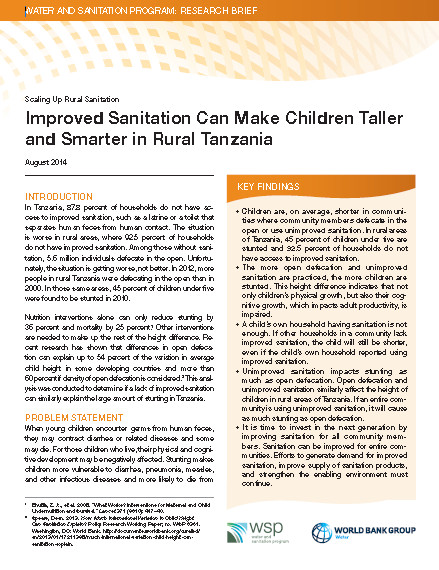Improved Sanitation Can Make Children Taller and Smarter in Rural Tanzania
 |
note Aug 2014 ; 4 pages
Ed. WSP - Washington
Téléchargeable sous format: PdF
Téléchargeable chez l'éditeur
Page de présentation d'un éditeur
Abstract:
In Tanzania, 87.8% of households do not have access to improved sanitation, such as a latrine or a toilet that separates human feces from human contact. The situation is worse in rural areas, where 92.5% of households do not have improved sanitation. Among those without sanitation, 5.6 million individuals defecate in the open. Unfortunately, the situation is getting worse, not better. In 2012, more people in rural Tanzania were defecating in the open than in 2000. In those same areas, 45% of children under five were found to be stunted in 2010. Nutrition interventions alone can only reduce stunting by 36% and mortality by 25%. Other interventions are needed to make up the rest of the height difference. Recent research has shown that differences in open defecation can explain up to 54% of the variation in average child height in some developing countries and more than 60% if density of open defecation is considered. This analysis was conducted to determine if a lack of improved sanitation can similarly explain the large amount of stunting in Tanzania. This brief discusses an analysis conducted by WSP to examine the link between sanitation and stunting in Tanzania.
Mots clefs: |
alimentation, nutrition (CI) (DT) (OP) (ope) , ATPC Assainissement Total Piloté par la Communauté (CI) (DT) (OP) (ope) , enfant (CI) (DT) (OP) (ope) , rural (CI) (DT) (OP) (ope) , santé (CI) (DT) (OP) (ope) |
Pays concerné: |
Editeur/Diffuseur: |
|
WSP
-
Water and Sanitation Program - Washington - Etats Unis |
En cas de lien brisé, nous le mentionner à communication@pseau.org